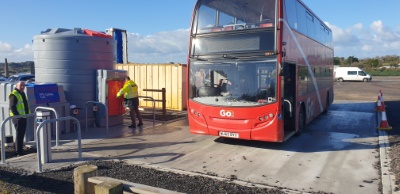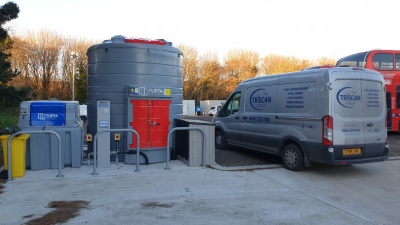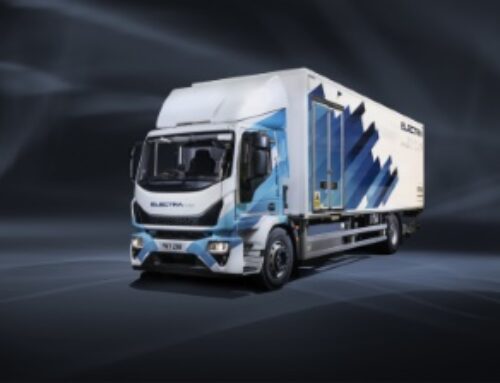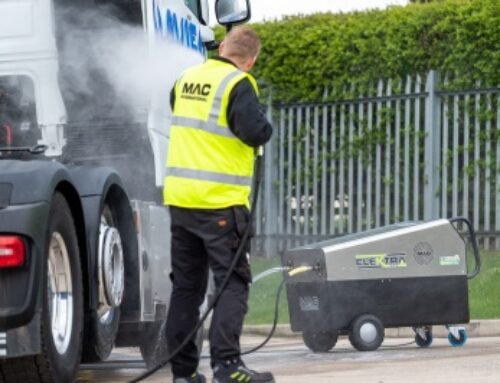Plymouth buses top up with Tuffa and Triscan
 Plymouth City Bus is benefiting from the installation of new Tuffa fuel tanks at its depots, as part of a project undertaken by fuelling specialist Triscan.
Plymouth City Bus is benefiting from the installation of new Tuffa fuel tanks at its depots, as part of a project undertaken by fuelling specialist Triscan.
Plymouth City Bus was formed 35 years ago when it took over the local bus service network from Plymouth City Council. Now owned by the Go-Ahead Group, it operates a modern fleet of buses, employing around 550 staff and transporting over 18 million passengers to their destinations each year.
After winning a tender to run three new routes across Cornwall, the bus company needed to obtain the facilities to manage the routes and began constructing three new bus depots at Penzance, Newquay and Scorrier. To achieve self-sufficiency, reduce fuel costs and enable quick bus refilling, the depots required bulk diesel and AdBlue dispensing.
Strict deadlines and a tight budget meant Plymouth City Bus needed an experienced fuel management team capable of offering a turn-key installation. Triscan has a national network of highly skilled engineers and has completed numerous projects for the Go-Ahead Group before, so offered a reassuring choice.
“We currently work with over 60 per cent of the UK’s bus and coach industry, using award-winning combinations of fuel software, hardware and access devices to provide accurate fuel tracking,” said Kerry Whittaker, group marketing executive.
“Triscan’s engineering team installed the Tuffa plastic tank alongside our fuel monitoring equipment, together helping Plymouth Bus to unlock fuel and carbon savings alongside easy access to helpful information such as BSOG reporting.”
Triscan allocated a dedicated project manager to the job and analysed Plymouth City Bus’ fuel consumption data to provide a recommendation of a minimum diesel storage capacity of 10,000 litre diesel and an ideal capacity of 15,000 litres at each site.
Triscan has been working with Tuffa for over a decade and in that time has installed a huge variety of Tuffa tanks for diesel, petrol and AdBlue storage and dispensing. Tuffa reports that its 15,000 litre plastic bunded diesel tank perfectly met Plymouth City Bus’s requirements for high capacity yet affordable storage.
The higher 15,000 litre capacity can be more beneficial, says Tuffa, as the tanks require refilling less frequently and are more cost-effective in the long-term due to incrementally cheaper fuel rates. The manufacturer has facilities that enable it to rotomould plastic bunded diesel tanks in this capacity, whereas achieving the storage requirement of 15,000 litres would otherwise require steel tanks.
While Tuffa’s experienced welders are more than capable of fabricating steel bunded tanks in much higher capacities, it would inevitably mean longer lead times, says the firm – and with mild steel doubling in price post-Covid the material costs would be higher too.
 Tuffa adds that its 15,000-litre plastic bunded diesel tank and 2,500-litre plastic bunded AdBlue tank offer a reliable tank combination that Triscan has used on previous projects. AdBlue consumption is typically around five per cent of diesel consumption so a much smaller tank is more than sufficient. However, AdBlue can be stored for over a year when kept in optimum conditions so with little risk of degrading it’s often more convenient and cheaper to install a larger capacity tank than strictly required.
Tuffa adds that its 15,000-litre plastic bunded diesel tank and 2,500-litre plastic bunded AdBlue tank offer a reliable tank combination that Triscan has used on previous projects. AdBlue consumption is typically around five per cent of diesel consumption so a much smaller tank is more than sufficient. However, AdBlue can be stored for over a year when kept in optimum conditions so with little risk of degrading it’s often more convenient and cheaper to install a larger capacity tank than strictly required.
Plymouth City Bus accepted project plans from Triscan, and the Tuffa team then quickly set about rotomoulding the primary tanks and bunds using a high shot weight of UV stabilised and corrosion resistant polymer. This produces a strong and extremely durable tank, says Tuffa, with a minimum 20-year design line and 10-year warranty.
The AdBlue tank was then fitted with a flip lid while the large diesel tank was fitted with a lockable cabinet, both of which house the low-maintenance dispensing equipment.
To enable synchronisation with Triscan’s own fuel management system, Apollo 2, both the diesel and AdBlue tanks were factory-fitted with digital flowmeters (K600 B3 and K24 respectively). The secure Triscan Apollo 2 system allows authorised drivers to fuel their buses while enabling the Go-Ahead group to gather stock levels and accurate MPG figures for the buses and drivers.
As well as increasing security and reducing the risk of fuel theft, the data provided by the fuel management system can be critical in reducing transport costs – for example, by helping to identify buses with a higher MPG than expected which would indicate a mechanical issue, or by highlighting drivers who would benefit from extra training to improve fuel consumption.
With the tanks swiftly delivered to the three Cornwall sites, Triscan’s engineers constructed the compliant refuel stations at the depots. This included installing the diesel and AdBlue tanks on a new concrete base with horseshoe bollards, kill switches and spill kits to prevent accidents and protect the sites.
Each of Plymouth City Bus’s new routes now has a dedicated fuel depot giving the bus company greater control of fuel usage and monitoring while allowing them to fulfil their tender and get passengers to their destinations on time.











